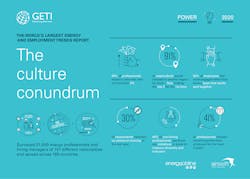Workforce Survey: Power Sector Must Invest in Training or Risk Talent Turmoil
Airswift and Energy Jobline surveyed 21,000 energy professionals and hiring managers in 169 countries across five industry sub-sectors: oil and gas, renewables, power, nuclear and petrochemicals.
The fourth annual Global Energy Talent Index (GETI), an energy recruitment and employment trends report, showed that power professionals are concerned at a perceived lack of investment in their training and development.
The report by Airswift, the global workforce solutions provider for the energy, process and infrastructure sectors, and Energy Jobline, a job site for the energy and engineering industries, reveals that nearly half of sector professionals believe that their employer does not regularly invest in their training and development and one-in-three claim not to have received any training in the past year.
Of those who do receive regular training, two-thirds say it relates to improving their current job performance. Few training recipients say it relates to skills beyond their current job (20 percent) or to further their career (15 percent).
Janette Marx, chief executive officer at Airswift, says: “The power sector has long been admired for providing a relatively stable home for its workforce. However, firms will need to provide more as the competition for talent intensifies between rival sectors.
“Training and development is an important piece of the puzzle and there is certainly room for employers to improve their offers. But offering more and better training opportunities isn’t enough. Companies should also consider how they formalize their programs and ensure that professionals at all levels are aware of the options that are available and how to access them.”
In addition to providing much-needed insights into professionals’ satisfaction with training and a number of wider cultural issues, GETI is also the industry’s most comprehensive salary and mobility study.
Key findings within power include:
- Remuneration continues to rise, albeit slower than last year. Forty-eight percent of professionals have seen an increase in pay over the past year – nine percent fewer than last year and below the expectations of the 74 percent who said they were expecting a raise during 2019
- The sector remains optimistic of pay increases on the horizon. Seventy-one percent of both hiring managers and non-hiring professionals foresee raises in 2020, with 42 percent of hiring managers anticipating increases of more than five percent
- Eighty-eight percent of professionals would consider relocating to another region for their job. Europe remains the most popular destination, followed by the Middle East, though Asia has leapfrogged North America into third place
- Renewables and oil and gas remain the biggest sources of competition for talent, winning the votes of 48 percent and 41 percent of those open to switching sectors, respectively
Hannah Peet, managing director at Energy Jobline, says: “Power companies have typically relied on their stability to attract and retain the staff they need but competition for talent in the energy industry keeps getting tougher and tougher.
“So where calmness leads, complacency must not follow. A renewed focus on the basics of pay and progression opportunities – coupled with greater strides on diversity and inclusion – is needed to ensure that the sector’s foundation is strong as well as steady.”
The report is available to download at http://www.getireport.com/download-report.

